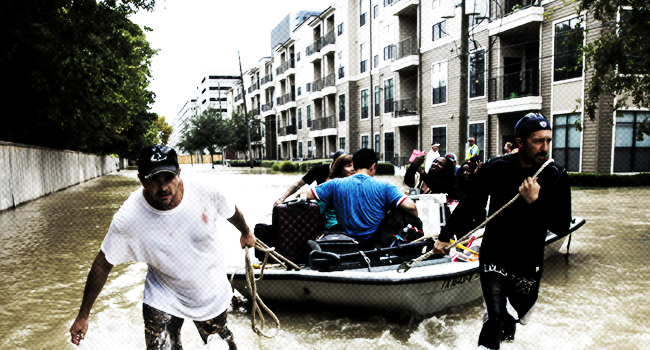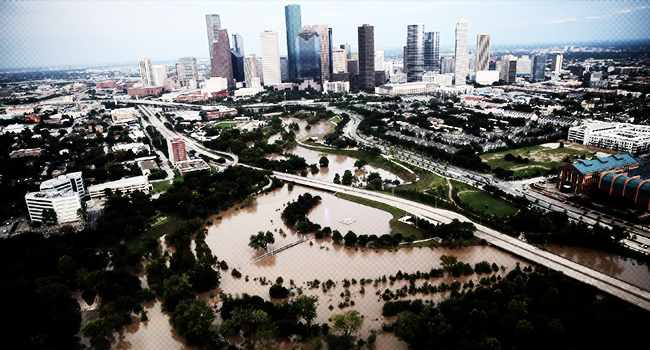
Survivor’s guilt is a real feeling. When a city you’ve called home your entire life is getting blitzed by historic rainfall and flooding, there aren’t many emotions to comb through. Fear predominates. I tried to find calm in the aftermath of Hurricane Harvey, to take all of the stories and photos and information and let it be a measure of resolve and strength. Nothing worked. By Saturday, as flood waters continued to rise, I assured myself that everything eventually had to end. The rain would cease and Houston — a city that has relied on itself for much of this storm — would get back to normal.
There would be no getting back to normal. By Tuesday afternoon, four days after the storm made initial landfall, people were openly weeping about the sun being visible through the clouds. A week ago, they stared at it because of a rare solar eclipse. Now they were looking upward and thanking God that it existed at all.
As I write this, I know that I’m currently in a place of privilege. I would be blind not to recognize it. Last Friday, Red Bull flew me out to their Culture Clash event, near Downtown Atlanta. Attempting to fly back into Houston on Saturday was obviously not going to happen. Both airports, Bush Intercontinental Airport and Hobby Airport were closed until further notice. Flood waters blocked entryway to Bush and Hobby took on enough water that the nearby freeway was spilling over. Without help from the Red Bull team, I wouldn’t have the safety and comfort of a place to stay until I can get home. Meanwhile, some friends back home had to be rescued by boat, because their house had taken water.
There’s no scarier feeling than having to reassure someone that they’re not going to die because of this storm, even when they’re surrounded by knee-deep water in their living room.
My parents, two slightly stubborn 60-year-olds, called me and checked in constantly. Their home in the suburb of Missouri City has seen its fair share of tornadoes in recent days. A twister touched down on the main artery of Missouri City, FM 2234, and did damage to a strip of businesses — less than two minutes away from my house. The power was knocked out and for 18 hours, my family had to make due as their street was flooded with knee-high water. My father, a kidney cancer survivor found himself stuck in his garage, holding onto a giant oxygen tank from Saturday evening to Sunday, one of the few things regulating his breathing after a COPD diagnosis in 2012.
Sunday night, after checking in with my parents and letting them know that I was safe, I heard the news of mandatory evacuations in Sugar Land, a suburb not too far from where my parents live. My friends who live there were understandably worried, clutching onto whatever faith they had. I broke down and cried. Cried because I wanted to be home, on the ground, assisting those who needed help. A wave of helplessness washed over me and, speaking to friends from across the country who assumed I was in Houston, I relayed that feeling over and over again.
“I’m not home, but I want to be home,” I said. “I want to hug my parents and help my friends. I just want to see my city again.”
After watching the national media chime in with loud (and sometimes baseless) Houston hot takes, I finally understood what I could do while 800 miles away. I could spread correct information. Every opinion on why a city of 6.8 million people didn’t evacuate on 48 hours notice made my blood boil. They didn’t realize the last time we attempted a mass evacuation of the city on short notice it resulted in 130 people dying due to heat exhaustion, a bus carrying 24 elderly passengers blowing up and thousands of people stretched out on the three main entry points into Houston, stranded without food or gas. A normal commute to San Antonio, Texas takes two hours. Dallas would take four. Some people endured hours, if not a full day of traveling just to reach destinations outside of the city. What was even more glaring? The lack of understanding that it’s a privilege for some to even leave their homes and land with family elsewhere.

Cooped up in an Atlanta hotel room, fielding calls and watching the news, I saw the anger building. Not just from Houstonians tired of people capitalizing on their pain for a news story or a soundbyte, but from those who wanted their longstanding gripes and agendas against certain individuals to be amplified by disaster. People from across the country lashed out at Joel Olsteen for not opening the doors of his mega-church, but it was nervous, angry energy more than anything. I hope people maintain that same energy when it comes time to volunteer for those in need.
Because Houston will need. Despite the resilience of citizens who rescued their neighbors and complete strangers via boats, trucks and whatever vehicle they had to carry people to safety, there was massive loss. Some people don’t have jobs to go to anymore, others who had to fight with Harvey damaging Houston, are now caught in a panic about their loved ones some 90 minutes down the road in Beaumont or Port Arthur. I watched people share videos on social media about rising flood waters while carrying the strength to say, “This storm won’t break me.”
It’s not going to break the musicians who reminded people that they were citizens first and rescued people, or offered up hotels for them to stay in, free of charge. It’s not going to break Houstonians who coordinated thousands of meals to be delivered to shelters for those in need. It’s not going to break Mayor Sylvester Turner who has handled the entire storm with a class and grace. To know Houston, the bayou city that is swelteringly hot nearly three-fourths of the year, is to also know the people, the culture and the communities. How they can force a smile out of someone in the bleakest of moments and how when attacked, they will band together regardless of race, color, sexual orientation or creed.
I miss being home. I miss my family and I miss my friends. Taking the storm in from a distance as a native Houstonian is similar to being handcuffed and watching an unspeakable act occur right in front of your eyes. I know when I get back I may not have a job for weeks, if not months.
But I have my voice. Houston is strong and will forever be strong. Storms come and go, flood waters subside and property can be replaced. This city knows its true power, and the world is witnessing that first hand.






